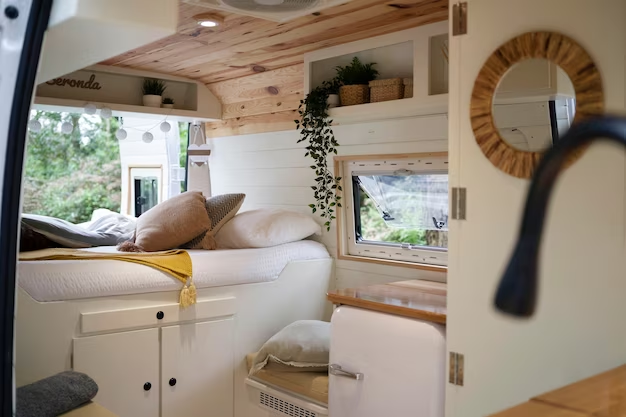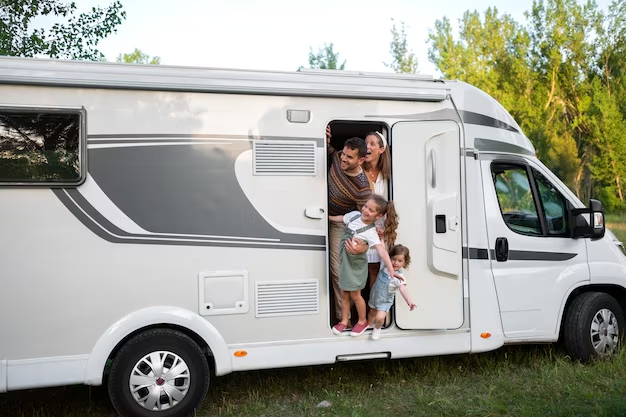In today’s fast-paced world, the question “Can you rent mobile homes?” is more relevant than ever. With the rising costs of traditional housing and the allure of a more flexible lifestyle, mobile homes offer an intriguing option for many. This article will explore the ins and outs of renting mobile homes, providing you with all the information you need to make an informed decision.
What Are Mobile Homes?

Mobile homes, also known as manufactured homes, are prefabricated structures built in a factory and then transported to a site. These homes are designed to be lived in and can be placed in designated mobile home parks or on private land. They come in various sizes and configurations, catering to different living preferences and needs.
Characteristics of Mobile Homes
Mobile homes have distinct characteristics that set them apart from traditional site-built homes. Here are some key features:
- Prefabricated Construction: Built in a factory and transported to the installation site.
- Steel Chassis: Most mobile homes are mounted on a steel chassis, making them easily movable.
- Wheels and Axles: Designed for transportation, they come with wheels and axles.
- Affordable Housing Option: Generally more affordable than traditional houses.
- Varying Sizes and Designs: Available in single-wide and double-wide configurations, with diverse floor plans.
Renting vs. Buying Mobile Homes
When considering mobile home living, you must decide whether to rent or buy. Each option has its advantages and disadvantages, and your choice will depend on your financial situation, lifestyle, and long-term plans.
| Options | Advantages | Disadvantages |
| Renting Mobile Homes | Flexibility and ease of relocation, allowing you to move to new areas as circumstances or preferences change. | No equity is built as a renter, and you have limited control over the property, impacting long-term financial benefits. |
| Lower upfront financial commitment required, making it a more accessible option for those with limited savings. | Continuous monthly rent payments without the benefit of investing in a long-term asset. | |
| Maintenance and repairs are typically handled by landlords, reducing the renter’s responsibilities and potential expenses. | Limited freedom in customizing or modifying the mobile home, often requiring landlord approval for changes. | |
| Buying Mobile Homes | Ownership allows for building equity over time, contributing to long-term financial stability and potential profit. | Higher initial costs due to down payments, closing costs, and financing, requiring a significant financial commitment. |
| Potential for the property to appreciate in value, providing a return on investment and opportunity for profit upon selling. | Responsibility for all maintenance and repairs, which can be costly and time-consuming. | |
| Complete freedom to customize, renovate, and improve the property according to personal tastes and needs. | Owning ties you to a specific location, reducing flexibility and mobility, especially if relocation becomes necessary or desirable. |
Finding Mobile Homes for Rent
If you’re in the market for renting a mobile home, you have several options at your disposal. Below are some various methods and platforms for finding mobile homes for rent:
Online Platforms
Online platforms have become increasingly popular for searching and finding mobile homes for rent. They offer a wide range of options and are convenient for narrowing down your choices. Here are some of the top platforms to consider:
- Zillow: Zillow is a well-known real estate website that includes listings for mobile homes for rent.
- Craigslist: Craigslist’s housing section often features mobile home rental listings posted by landlords.
- Specialized Sites: Websites specifically dedicated to mobile home rentals, such as MHVillage and Mobile Home Village, provide a niche focus on mobile home listings.
Local Real Estate Agents
Local real estate agents can be valuable resources when searching for mobile home rentals in your desired area. They have local knowledge and connections to help you find the perfect mobile home. Here’s how to approach this option:
- Research and contact local real estate agencies in your target location.
- Communicate your specific requirements, such as budget, size, and location preferences.
- Ask for regular updates and new listings that match your criteria.
- Consider their fees, as some real estate agents may charge a commission for their services.
Visiting Mobile Home Parks
Visiting mobile home parks in person can be a proactive way to find available rentals. This method allows you to explore the community and speak directly with park managers or residents. Here’s how to go about it:
- Identify mobile home parks in your desired area through online research or local directories.
- Visit the parks in person to get a sense of the community, amenities, and available mobile homes.
- Speak with park managers or residents to inquire about current and upcoming rental opportunities.
- Be prepared to provide information about your rental preferences and budget.
What to Consider When Renting a Mobile Home

Alt: Mobile Home
To ensure a smooth and satisfying experience when renting a mobile home, it’s essential to consider several crucial factors. Let’s explore these considerations:
Location
The location of the mobile home park is a paramount consideration that can significantly impact your lifestyle and daily commute. Here’s a breakdown of key location-related factors:
| Location Considerations | Description |
| Proximity to Work and Amenities | Consider how close the park is to your workplace, schools, healthcare facilities, shopping, and entertainment options. |
| Safety and Neighborhood Vibe | Research the safety of the area and the overall neighborhood vibe to ensure it aligns with your preferences. |
| Local Climate | Evaluate the local climate and weather conditions, especially if you’re relocating from a different region. |
Park Rules
Every mobile home park has its own set of rules and regulations that residents are expected to follow. It’s crucial to review and ensure that these rules align with your lifestyle and preferences. Here’s a checklist of park rules to consider:
- Pet Policies: Check if pets are allowed, and if so, inquire about any breed or size restrictions and associated fees.
- Noise Restrictions: Understand the park’s policies on noise levels and quiet hours.
- Guest Policies: Review the rules concerning guests and how long they can stay.
- Maintenance Responsibilities: Determine your responsibilities for maintaining the mobile home and the surrounding area.
- Lease Terms: Carefully read and understand the lease terms, including rent, utilities, and lease duration.
Size and Layout
The size and layout of the mobile home are critical factors to ensure it meets your space needs and preferences. Consider the following:
| Size and Layout Considerations | Description |
| Number of Bedrooms and Bathrooms | Evaluate the number of bedrooms and bathrooms to accommodate your household comfortably. |
| Interior Layout | Assess the interior layout to ensure it fits your furniture, appliances, and lifestyle requirements. |
| Storage Space | Determine the availability of storage space, including closets, cabinets, and outdoor storage sheds. |
| Outdoor Living Area | Consider any outdoor living spaces like decks, patios, or yards for recreational and relaxation purposes. |
Condition
Before signing a lease, it’s imperative to thoroughly inspect the mobile home for any damages or issues. A comprehensive inspection can help prevent future problems and ensure you’re renting a well-maintained property. Here’s a checklist for inspecting the mobile home’s condition:
- Structural Integrity: Examine the roof, walls, and floors for signs of water damage, leaks, or structural issues.
- Appliances and Fixtures: Test all appliances, plumbing, and electrical fixtures to ensure they are in working order.
- Heating and Cooling Systems: Check the HVAC system for proper functioning and efficiency.
- Insulation and Energy Efficiency: Evaluate the insulation and energy efficiency of the mobile home to assess heating and cooling costs.
The Legal Aspect of Renting Mobile Homes
It’s important to understand the legalities when you decide to rent mobile homes. This includes lease agreements, park rules, and tenant rights, which vary by state and locality.
Lease Agreements
A mobile home lease agreement is a legally binding document that outlines the terms and conditions of the rental arrangement. Here are the key components typically found in such agreements:
| Component | Description |
| Parties Involved | Names and contact information of both the landlord and the tenant. |
| Property Description | Detailed information about the mobile home, including its location and any included amenities. |
| Rent and Payment Terms | Specifies the monthly rent amount, due date, accepted payment methods, and any late fees. |
| Lease Duration | The length of the lease, including the start and end dates. |
| Security Deposit | The amount of the security deposit, conditions for its return, and deductions that may apply. |
| Maintenance Responsibilities | Clarifies who is responsible for repairs, maintenance, and upkeep of the mobile home and the lot. |
| Rules and Regulations | Any specific rules and regulations governing the mobile home park, such as pet policies or noise restrictions. |
| Termination Clause | Details the process for ending the lease, including notice periods and reasons for termination. |
| Dispute Resolution | Outlines the procedure for resolving disputes between the landlord and the tenant. |
| State-Specific Addenda | Any additional clauses or disclosures required by state law. |
Lease agreements for mobile homes can vary significantly from state to state. Some states have specific regulations that must be included in the lease, such as:
- Notice requirements for rent increases or termination of the lease.
- Regulations governing the return of security deposits.
- Mandatory disclosures about lead-based paint or other environmental hazards.
- Provisions related to rent control or rent stabilization in certain areas.
It is crucial for both landlords and tenants to be aware of the specific legal requirements in their state and locality to ensure compliance.
Park Rules and Regulations
Mobile homes are often situated in mobile home parks or communities, and these parks typically have their own set of rules and regulations. These rules can impact the daily lives of tenants and are an essential aspect of the legal framework for renting mobile homes.
While park rules can vary, some common regulations may include:
- Pet Policies: Restrictions on the types and number of pets allowed within the park.
- Quiet Hours: Designated periods of quiet during which noise should be minimized.
- Maintenance Standards: Guidelines for the maintenance and appearance of mobile homes and lots.
- Visitor Policies: Rules regarding the number and duration of visitor stays.
- Amenities Usage: Guidelines for using communal amenities like swimming pools, clubhouse, and playgrounds.
Failure to comply with park rules can result in warnings, fines, or even eviction from the mobile home park. Tenants should thoroughly review and understand these rules before signing a lease.
Tenant Rights
Tenants of mobile homes have legal rights that protect them from unfair practices and ensure a habitable living environment. These rights can vary depending on local and state laws, but some fundamental tenant rights include:
- Right to a Habitable Home: Landlords must provide mobile homes that meet basic safety and health standards.
- Right to Privacy: Tenants have the right to enjoy their home without unreasonable intrusion by the landlord.
- Right to Repairs: Landlords are typically responsible for maintaining and repairing essential utilities and facilities.
- Right to Fair Housing: Discrimination based on race, religion, gender, or other protected characteristics is illegal.
- Right to Security Deposit Protection: Security deposits should be handled in accordance with state laws, with clear documentation.
Tenants should familiarize themselves with their specific rights under local laws and seek legal counsel if they believe their rights are being violated.
Conclusion
The question “Can you rent mobile homes?” is met with an affirmative and enthusiastic yes. Renting a mobile home presents a unique and affordable housing option, suitable for a variety of lifestyles and needs. Whether you’re an individual, a family, or a senior, the world of mobile home rentals offers flexibility, community, and the comfort of home without the hefty price tag of traditional housing.
FAQ
Q: Can you rent mobile homes on a short-term basis?
A: Yes, some parks offer short-term leases, though they are less common.
Q: Are pets allowed in mobile home rentals?
A: This varies by park. Some allow pets with certain restrictions.
Q: Can you rent mobile homes with bad credit?
A: Yes, but it might be more challenging. Some landlords or parks may require a higher deposit.
Q: Is it possible to rent mobile homes in any state?
A: Yes, mobile homes are available for rent in most states across the USA.
Q: Are mobile homes safe and durable?
A: Modern mobile homes are built to strict safety standards and are quite durable.



